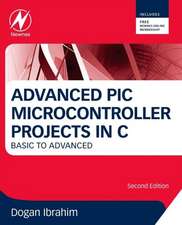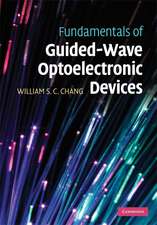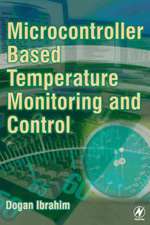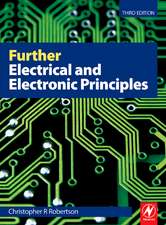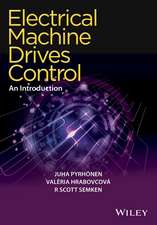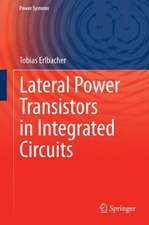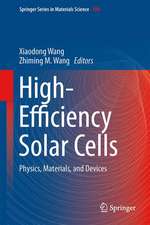Physics and Technology of Amorphous-Crystalline Heterostructure Silicon Solar Cells: Engineering Materials
Editat de Wilfried G. J. H. M. van Sark, Lars Korte, Francesco Rocaen Limba Engleză Hardback – 22 oct 2011
In this book, the editors present an overview of the state-of-the-art in physics and technology of amorphous-crystalline heterostructure silicon solar cells. The heterojunction concept is introduced, processes and resulting properties of the materials used in the cell and their heterointerfaces are discussed and characterization techniques and simulation tools are presented.
| Toate formatele și edițiile | Preț | Express |
|---|---|---|
| Paperback (1) | 1231.32 lei 6-8 săpt. | |
| Springer Berlin, Heidelberg – 6 dec 2013 | 1231.32 lei 6-8 săpt. | |
| Hardback (1) | 1237.30 lei 6-8 săpt. | |
| Springer Berlin, Heidelberg – 22 oct 2011 | 1237.30 lei 6-8 săpt. |
Din seria Engineering Materials
- 18%
 Preț: 1390.89 lei
Preț: 1390.89 lei - 18%
 Preț: 1236.99 lei
Preț: 1236.99 lei - 24%
 Preț: 829.35 lei
Preț: 829.35 lei - 18%
 Preț: 1001.02 lei
Preț: 1001.02 lei - 20%
 Preț: 573.70 lei
Preț: 573.70 lei - 17%
 Preț: 490.23 lei
Preț: 490.23 lei - 18%
 Preț: 891.33 lei
Preț: 891.33 lei - 15%
 Preț: 644.95 lei
Preț: 644.95 lei - 18%
 Preț: 892.90 lei
Preț: 892.90 lei - 18%
 Preț: 1384.75 lei
Preț: 1384.75 lei - 18%
 Preț: 1002.61 lei
Preț: 1002.61 lei -
 Preț: 343.98 lei
Preț: 343.98 lei - 18%
 Preț: 997.09 lei
Preț: 997.09 lei - 18%
 Preț: 1106.00 lei
Preț: 1106.00 lei - 18%
 Preț: 1120.99 lei
Preț: 1120.99 lei - 15%
 Preț: 703.85 lei
Preț: 703.85 lei - 15%
 Preț: 658.05 lei
Preț: 658.05 lei - 18%
 Preț: 889.75 lei
Preț: 889.75 lei - 18%
 Preț: 946.55 lei
Preț: 946.55 lei - 18%
 Preț: 1396.43 lei
Preț: 1396.43 lei - 18%
 Preț: 1101.26 lei
Preț: 1101.26 lei - 17%
 Preț: 428.09 lei
Preț: 428.09 lei - 18%
 Preț: 1111.85 lei
Preț: 1111.85 lei - 18%
 Preț: 1588.67 lei
Preț: 1588.67 lei -
 Preț: 388.45 lei
Preț: 388.45 lei - 20%
 Preț: 566.87 lei
Preț: 566.87 lei - 18%
 Preț: 949.42 lei
Preț: 949.42 lei - 15%
 Preț: 631.72 lei
Preț: 631.72 lei - 15%
 Preț: 640.88 lei
Preț: 640.88 lei - 15%
 Preț: 635.47 lei
Preț: 635.47 lei - 18%
 Preț: 1233.20 lei
Preț: 1233.20 lei - 18%
 Preț: 1548.11 lei
Preț: 1548.11 lei - 18%
 Preț: 1126.03 lei
Preț: 1126.03 lei - 15%
 Preț: 638.11 lei
Preț: 638.11 lei - 15%
 Preț: 637.46 lei
Preț: 637.46 lei - 18%
 Preț: 1217.10 lei
Preț: 1217.10 lei - 18%
 Preț: 945.62 lei
Preț: 945.62 lei - 18%
 Preț: 948.61 lei
Preț: 948.61 lei - 18%
 Preț: 1224.54 lei
Preț: 1224.54 lei -
 Preț: 367.93 lei
Preț: 367.93 lei - 15%
 Preț: 639.25 lei
Preț: 639.25 lei - 15%
 Preț: 643.34 lei
Preț: 643.34 lei - 18%
 Preț: 955.08 lei
Preț: 955.08 lei - 15%
 Preț: 645.79 lei
Preț: 645.79 lei - 18%
 Preț: 1114.34 lei
Preț: 1114.34 lei - 18%
 Preț: 1217.10 lei
Preț: 1217.10 lei
Preț: 1237.30 lei
Preț vechi: 1508.90 lei
-18% Nou
Puncte Express: 1856
Preț estimativ în valută:
236.75€ • 247.21$ • 195.50£
236.75€ • 247.21$ • 195.50£
Carte tipărită la comandă
Livrare economică 15-29 aprilie
Preluare comenzi: 021 569.72.76
Specificații
ISBN-13: 9783642222740
ISBN-10: 3642222749
Pagini: 596
Ilustrații: XXII, 582 p.
Dimensiuni: 155 x 235 x 42 mm
Greutate: 1.01 kg
Ediția:2011
Editura: Springer Berlin, Heidelberg
Colecția Springer
Seria Engineering Materials
Locul publicării:Berlin, Heidelberg, Germany
ISBN-10: 3642222749
Pagini: 596
Ilustrații: XXII, 582 p.
Dimensiuni: 155 x 235 x 42 mm
Greutate: 1.01 kg
Ediția:2011
Editura: Springer Berlin, Heidelberg
Colecția Springer
Seria Engineering Materials
Locul publicării:Berlin, Heidelberg, Germany
Public țintă
ResearchCuprins
Foreword.- Introduction.- Status of heterojunction solar cell R&D.- Basic features of Heterojunctions illustrated by selected experimental methods and results.- Deposition methods of thin film silicon.- Electronic properties of ultrathin a-Si:H layers and the a-Si:H/c-Si interface.- Degradation of (bulk and thin film) a-Si and interface passivation.- Photoluminescence and electroluminescence for a Si:H/c Si device and interface characterization.- Deposition and properties of transparent conductive oxides.- Metallization and formation of contacts.- Electrical and optical characterization of a-Si:H/c Si cells.- Wet-chemical pre-treatment of c Si for a-Si:H/c-Si heterojunctions.- Theory of heterojunctions and the determination of band offsets from electrical measurements.- Modeling and simulation of a Si:H/c Si cells.- Surface passivation using ALD Al2O3.- Introduction to AFORS-HET.- Hands-on experience with simulation tools.- a-Si:H/c-Si heterojunction and other high efficiency solar cells: a comparison.- Rear contact cells.- Progress in systematic industrialization of Hetero-Junction-based Solar Cell technology.
Textul de pe ultima copertă
The challenge of developing photovoltaic (PV) technology to a cost-competitive alternative for established energy sources can be achieved using simple, high-throughput mass-production compatible processes. Issues to be addressed for large scale PV deployment in large power plants or in building integrated applications are enhancing the performance of solar energy systems by increasing solar cell efficiency, using low amounts of materials which are durable, stable, and abundant on earth, and reducing manufacturing and installation cost. Today’s solar cell multi-GW market is dominated by crystalline silicon (c-Si) wafer technology, however new cell concepts are entering the market. One very promising solar cell design to answer these needs is the silicon hetero-junction solar cell, of which the emitter and back surface field are basically produced by a low temperature growth of ultra-thin layers of amorphous silicon. In this design, amorphous silicon (a-Si:H) constitutes both "emitter" and "base-contact/back surface field" on both sides of a thin crystalline silicon wafer-base (c-Si) where the photogenerated electrons and holes are generated; at the same time, a Si:H passivates the c-Si surface. Recently, cell efficiencies above 23% have been demonstrated for such solar cells. In this book, the editors present an overview of the state-of-the-art in physics and technology of amorphous-crystalline heterostructure silicon solar cells.
Caracteristici
Updated state-of-the art of heterojunction thin film solar cell research Written for all experts in this field Recent research in Physics and Technology of Amorphous-Crystalline Heterostructure Silicon Solar Cells

